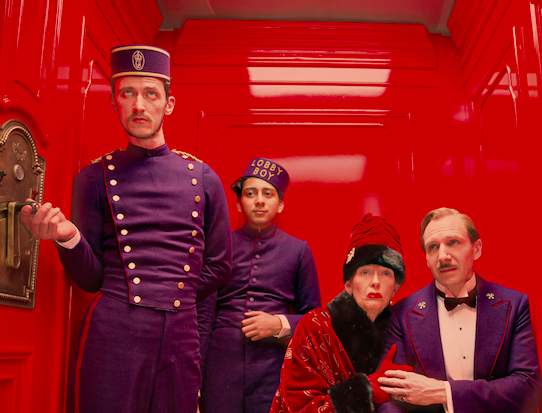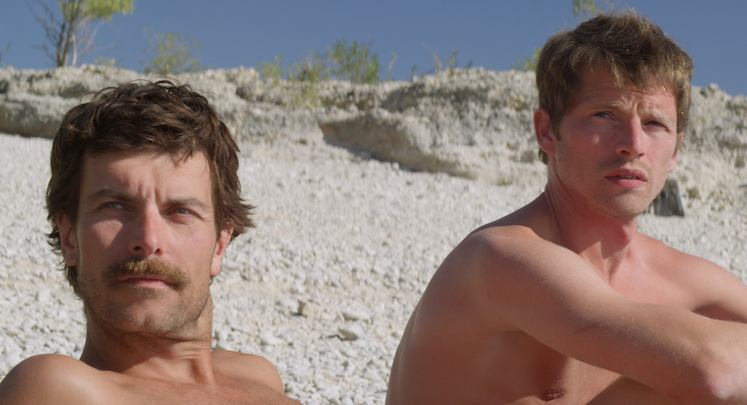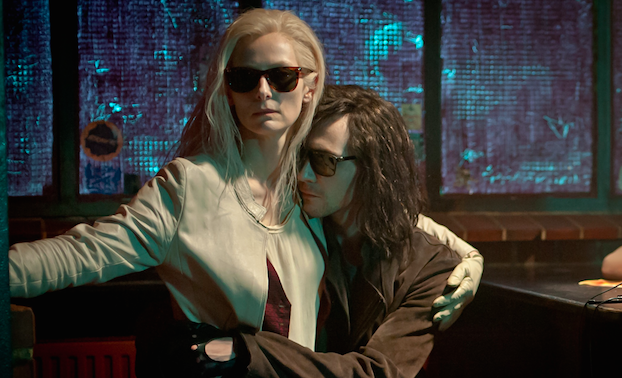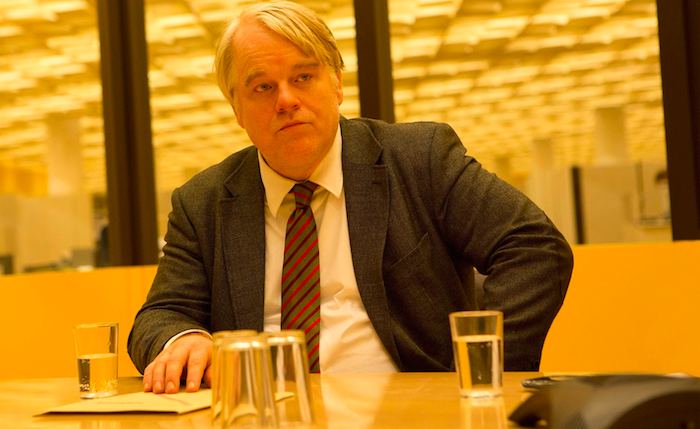Films from off the beaten path ● by Craig J. Clark
As is usual, this year had its share of blockbusters doing booming business at the box office. (At press time, ten films had crossed the $200 million threshold domestically, with one – Transformers: Age of Extinction – topping $1 billion worldwide.) If you’re into the Marvel Cinematic Universe (a model being applied to seemingly everything under the sun, from competing comic-book franchises to Universal Monsters to Robin Hood and his Merry Men), then you had two opportunities to stay in the thick of it with Captain America: The Winter Soldier and Guardians of the Galaxy (currently the #1 movie of the year). If animation’s your beat, then The LEGO Movie, Big Hero 6, and How to Train Your Dragon 2 were the ones for you. And if sequels and remakes are your thing, well, let’s just say you had no shortage of options. (Tellingly, one has to go all the way to the 16th film on the domestic chart – Christopher Nolan’s Interstellar – to find a wholly original property.)
Putting aside the big guns, 2014 also saw the release of plenty of other, smaller-scale films that are worth your while. In this space, I’ll be highlighting fourteen of them. Consider it a handy checklist the next time you’re poking around Netflix in search of something edifying to watch.
Stranger by the Lake
A film I had been dying to see ever since it premiered at Cannes in 2013, Stranger takes place at a secluded lakefront property where gay men congregate to lie on the beach nude, occasionally go swimming, and more frequently head into the surrounding woods to go cruising and have sex. Writer/director Alain Guiraudie is extremely frank about all of this, so if male nudity and graphic depictions of gay sex bother you, Stranger by the Lake may not be for you. It was very much for me, though, even before the plot – about an aimless young man who witnesses a murder and keeps it to himself because he has the hots for the perpetrator – kicks in.
Michel et Franck
●
The young man in question is Franck (Pierre Deladonchamps), who splits his time between swimming, conversing with an older overweight man named Henri (Patrick d’Assumçao) who has his own private spot away from the other men, and pursuing the handsome, hirsute Michel (Christophe Paou), whose rugged good looks are enough to keep Franck interested after he witnesses Michel drowning his previous lover late one night. It’s obvious Franck is driven by desire and naked lust – there’s a strong subtext about the dangers of unprotected sex – but it’s a mystery why that short-circuits logic and his instinct for self-preservation. Even when a police inspector (Jérôme Chappatte) comes around asking pointed questions, Franck lies to cover up for Michel and disclaim that he witnessed the murder. Then there’s the inspector’s assertion that the behavior of homosexuals is strange to him, which some may read as homophobic, but I think the stronger case can be made for the idea that the film is about reckless behavior in general. Plus, it’s incredibly, incredibly hot. In my book, that counts for a lot.
Under the Skin
This past spring’s poster child for The Little Film That Could Divide Audiences, Under the Skin was co-written and directed by Jonathan Glazer, who originally made his name by directing striking music videos (Radiohead’s “Karma Police”), so it should come as no surprise that his emphasis is on the visuals, which periodically comes at the expense of telling a straightforward story. That’s just fine by me, though. Who needs straightforward when elliptical is also on the menu?
I wouldn’t dream of trying to unlock the film’s puzzle box of a plot, which comes with a number of pieces that don’t seem to fit together. Even the actions of our protagonist (a scarily blank Scarlett Johansson) remain largely inscrutable, although it eventually becomes clear that she’s an alien creature tooling around Scotland in a white van on the prowl for unattached males. That a certain number of them are willing to accept a lift from her may have something to do with her allure, but it also speaks to her dogged persistence. Over time, there are enough mysterious disappearances that news of them starts getting reported on the radio, but first she lets a speck of humanity show through her veneer when she picks up a deformed young man and genuinely seems touched by his plight. Then again, as the climax of the film reveals, she’s well aware of the importance of looking beneath the surface.
The Grand Budapest Hotel
[The image at the top of this post is from The Grand Budapest Hotel.]
Set in the (former) Republic of Zubrowka, which is situated somewhere in Eastern Europe, Wes Anderson’s latest is the narrative equivalent of a matryoshka doll, with a number of nested stories that take us from the present day, in which a visitor to a cemetery opens up a book of the same name, to 1985, when its author (Tom Wilkinson) penned it, to 1968, when his younger self (Jude Law) is told by the hotel’s owner (F. Murray Abraham) how he came to take possession of it. That leads to the body of the film, which was shot in the boxy Academy ratio to reflect that it takes place in the ’30s.
The main action revolves around dandyish concierge extraordinaire Gustave (Ralph Fiennes), who takes new lobby boy Zero (Tony Revolori, as the young Abraham) under his exacting wing and involves the impressionable lad in a rollicking adventure after an 84-year-old dowager countess (Tilda Swinton) dies and leaves him a priceless painting in her will. For a film that had the potential to become overstuffed and overbearing (the number of supporting characters is staggering), Anderson keeps things chugging along, aided by composer Alexandre Desplat’s sprightly score. And it’s gratifying to see that The Grand Budapest Hotel has become Anderson’s biggest moneymaker and has been receiving numerous awards from critic’s groups. Not that that’s his primary concern, but it does mean he’ll continue to have the freedom to create his films his own way.
Boyhood
A film of unprecedented ambition, Richard Linklater’s Boyhood was twelve years in the making, but that’s not what makes it so extraordinary. What’s extraordinary about it is its depiction of a family in a near-constant state of flux, muddling through life as best they can, the way we all do. It’s a film that traffics in monumental milestones and incremental changes alike, centered on a boy who grows into a young man right before our eyes.
When we first meet Mason (Ellar Coltrane, previously seen as one of Greg Kinnear’s children in Fast Food Nation), he’s six years old and living with his divorced mother (Patricia Arquette) and older sister Samantha (Lorelei Linklater, who similarly grows up over the course of the film). The concept of impermanence is introduced early on when Arquette announces they’re moving to Houston, forcing Mason and Samantha to leave everything – and everybody – they know behind. By the time they reconnect with their father (Ethan Hawke), he’s been out of the picture for a year and a half working in Alaska, but Mason still naïvely hopes his broken family can be made whole again. That this doesn’t happen is one of many disappointments he has to learn to live with.
As the years pass, the cultural signifiers change and unsuitable stepfathers come and go, but what Mason learns before heading off to college is the importance of being open to new experiences, which I imagine will serve him well. The same can be said for anybody willing to give Boyhood a try. Its running time of two hours and 45 minutes may seem daunting, but it’s the kind of film that comes along once in a lifetime and should be valued as such.
The Guest
One of the most propulsively entertaining films of the fall, which unaccountably failed to garner a wide release (the closest it came to Bloomington was Indianapolis), director Adam Wingard and screenwriter Simon Barrett’s follow-up to last year’s creative home-invasion horror You’re Next is a sleek John Carpenter homage that proves they learned much at their master’s feet. Buoyed by a synth-heavy score by Steve Moore, the film follows a mysterious soldier named David (Dan Stevens, who lets his intense stare and piercing blue eyes do most of the work for him) who shows up on the doorstep of the family of a fallen comrade to pass along the man’s dying words and then sticks around, less a ticking time bomb (early on, the father speculates that he could have “the PTSD”) than a loaded weapon with a hair trigger. With the military angle, there’s a fair bit of “The Monkey’s Paw” by way of Bob Clark’s Vietnam-era Deathdream in the mix, and the conspiracy that gets folded into it makes plain that David is no ordinary combat veteran, but we probably could have guessed that on our own. What’s perfectly clear to me is that with The Guest, Wingard and Barrett’s winning streak continues.
Snowpiercer
Proof that brain and brawns aren’t mutually exclusive, Bong Joon-ho’s first English-language feature was the summer blockbuster that wasn’t thanks to a bungled release that failed to capitalize on what is essentially a thrilling, unconventional action film. Perhaps its unconventionality is what prompted the Weinsteins to want to tamper with Bong’s cut, but I’m glad his vision of a dystopian future – set aboard a luxury train where the divide between the haves and have-nots is very sharp indeed – is the one that ultimately saw the light of day.
Life Itself
Right at the very top, director Steve James reveals that he started shooting this documentary just five months before Roger Ebert died in the spring of 2013. He never comes right out and says so, but it’s a fair bet that if he’d waited much longer, there wouldn’t have been a film at all – at least, not in its present form. Drawn from Ebert’s 2011 memoir of the same name, the film covers his extraordinary life and career, from his humble beginnings as a novice film critic at the Chicago Sun-Times to his collaboration with filmmaker Russ Meyer on Beyond the Valley of the Dolls to his Pulitzer to becoming one of the most unlikely of television personalities. As his health deteriorates, there are times when Life Itself becomes hard to watch, but Ebert was resolute enough to play the hand that was dealt him, overcoming seemingly insurmountable obstacles and finding his voice in a way that was truly courageous.
Only Lovers Left Alive
One thing Jim Jarmusch’s idiosyncratic take on vampire lore does exceedingly well is evoke the creeping boredom that is the bane of undying beings who have an eternity to fill. Case in point: Tom Hiddleston’s Adam, a centuries-old composer-turned-recluse who lives in a blighted area of Detroit, presumably because of his affinity for Motown. Jarmusch knows it wouldn’t do to have an Adam without giving him an Eve, who’s played by Tilda Swinton with a surprising lack of world-weariness considering she’s had much longer to grow weary of the world and its denizens. Then again, that could have something to do with the fact that she gets to hang out in Tangier with Christopher Marlowe (the ever-delightful John Hurt, also Snowpiercer’s wizened MVP). Alas, their happy reunion is spoiled when they’re joined by her reckless “sister” Ava (Mia Wasikowska), who drops in unannounced and presages their (self-)expulsion from Eden. As with a lot of Jarmusch’s work, Only Lovers is a slow-burner, but it’s a definite grower.
Tilda Swinton (Eve) & Tim Hiddleston (Adam)
●
The Wind Rises
Throughout his career, master animator Hayao Miyazaki has returned time and again to his fascination with flight in general and flying machines in particular. That’s why it’s so appropriate that his latest feature is centered on a man whose desire to be a pilot is scuttled by his nearsightedness, so instead he pours his passion into designing planes for others to fly. Based on the life of Jiro Horikoshi, who built the Zero fighter for the Japanese Navy, it’s easy to see why Miyazaki would be attracted to the story of an idealist who wants nothing more than to design beautiful airplanes. When reality conspires to make him apply his talents to the empire’s ever-expanding war machine, his feelings of frustration and loss are palpable. If this does indeed turn out to be Miyazaki’s final film, though, it’s a beautiful capper to his career.
Blue Ruin
In his 1966 film Torn Curtain, Alfred Hitchcock wanted to show how hard it is to actually kill somebody. In the contemporary thriller Blue Ruin, writer/director Jeremy Saulnier sought to illustrate a similar thing about revenge. In the latter, though, it’s not only dirty, it’s also extremely messy, at least the way revenge-seeker Dwight (Macon Blair) carries it out. Introduced living out of a rusty car on a beach, the bushy-bearded Dwight instantly gains a purpose when he’s informed of the impending release of the man convicted of murdering his parents some years back. In the early going, Saulnier keeps the dialogue to a minimum, which has the effect of making Dwight out to be a man of action, as inept and prone to injury (some of them of the self-inflicted variety) as he is. When his estranged friend Ben (Devin Ratray) enters the picture, he hits the nail right on the head when he declares, “This is ugly, man.” That it is. It’s also a tremendous success story that heralds the arrival of an exciting new talent.
A Most Wanted Man
Anybody looking for evidence of what was lost when Philip Seymour Hoffman died of a drug overdose earlier this year need look no further than this John le Carré adaptation, in which he plays the overweight, middle-aged head of a clandestine anti-terror unit based out of Hamburg. When a suspected Chechen terrorist shows up in his port, the old-school spymaster puts his network to work while simultaneously keeping tabs on a Muslim philanthropist suspected of funneling money to terrorists. Complicating matters is a civil-rights lawyer (Rachel McAdams) whose work puts her in contact with the suspected terrorist, forcing Hoffman to dip into morally and ethically murky waters to get what he wants. All told, it adds up to a scathing account of the hidden costs of the War on Terror, in which shortsightedness can override those advocating a longer view.
Philip Seymour Hoffman in A Most Wanted Man
●
Locke
The most riveting performance of the year goes to Tom Hardy for his virtuoso turn in this film, in which he is the only actor onscreen for the entire running time. The second feature from director Steven Knight (screenwriter of Eastern Promises and Dirty Pretty Things, which earned him an Oscar nomination), Locke portrays the fallout when a workaholic construction foreman who’s known for running a tight ship absents himself from the job on the eve of what his boss repeatedly reminds him is the “biggest concrete pour in Europe.” Since he’s pretty much the whole show, Hardy admirably rises to the challenge of holding the audience’s attention for 80 solid minutes behind the wheel of his car, fielding calls from everybody whose life is being affected by his decision. It’s a pity, then, that he isn’t getting more year-end recognition, but I’d say his stellar work more than speaks for itself.
Nymph()maniac
With its staggered, multi-platform release – the initial two-part theatrical cut, also released on VOD, followed by Lars von Trier’s director’s cut, likewise put out in two parts – it’s difficult to assess Nymph()maniac as a whole, but plenty of its parts are compelling on their own. Of them, none is more so than Uma Thurman’s role as the wrathful Mrs. H, who takes the title character (played as a teenager by Stacy Martin and as an adult by Charlotte Gainsbourg) to task for stealing her husband away, making sure their three young boys are present for the entire dramatic dressing-down. It’s a scene of apocalyptic anger and one that I hope will be remembered when the members of Academy set their minds to nominating actresses in the Best Supporting category. (Similarly, I hope they recognize Don Johnson’s supporting work in Don Mickle’s Cold in July, but I’m not holding my breath.)
The Strange Colour of Your Body’s Tears
Much like my #2 pick, this was one that I knew I was going to be picking up on Blu-ray well before its closing credits rolled. The latest neo-giallo from Amer writer/directors Hélène Cattet and Bruno Forzani, Strange Colour is mostly centered on frazzled businessman Dan Kristensen (Klaus Tange), whose wife has gone missing, leaving behind a series of bewildering clues. At the same time, it peels off periodically to dramatize the stories being told to him by the people he questions about her disappearance. Indulging their twin fetishes for extreme close-ups and narrative obscurantism, Cattet and Forzani stock the film with suspicious characters aplenty, some of whom have a predilection for kinky leather apparel (jackets and gloves, in particular). They also pull off a neat gender reversal, putting Dan in the position women tend to find themselves in more often than men in this genre. And they get points for revealing the meaning of their title without having somebody come right out and explain it. In an age where seemingly everything needs to be spelled out, that kind of restraint is to be savored.




